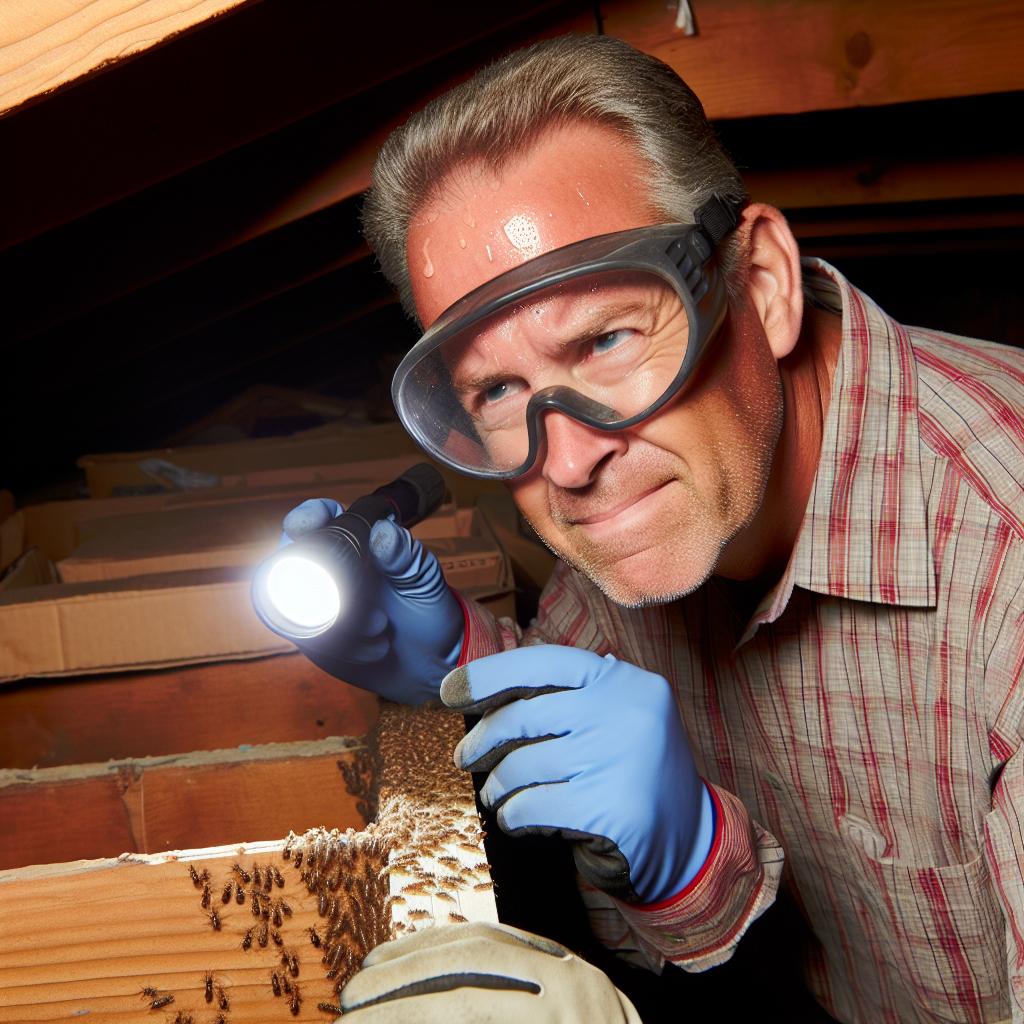Introduction:
A Pest Control Advisor provides guidance on pest management strategies.
Pest control is crucial in agriculture to protect crops from pests.
Furthermore, it is vital in safeguarding public health from disease-carrying insects.
This blog post will delve into the salary and job outlook for Pest Control Advisors.
Salary range for Pest Control Advisors:
The average salary for entry-level positions can range from $30,000 to $40,000 per year.
Factors that may affect salary include experience, location, and the type of employer.
Potential for salary growth with experience and certifications can lead to higher earnings over time.
Factors Affecting Salary for Pest Control Advisors:
Experience: Pest control advisors with more years in the field typically earn higher salaries.
Location: Salaries for pest control advisors can vary depending on the cost of living in different regions.
Type of Employer: Working for a large pest control company may offer better pay than a smaller business.
Potential for Salary Growth in Pest Control Advisory:
With increased experience and expertise, pest control advisors can move up the career ladder and earn more.
Obtaining certifications in pest control can also lead to higher-paying opportunities within the industry.
Continuous learning and staying updated on new pest control techniques can contribute to salary growth.
Career Outlook for Pest Control Advisors:
Overall, the salary and job outlook for pest control advisors are promising.
There are opportunities for growth and increased earnings with experience and certifications.
By considering factors such as location, experience, and employer type, pest control advisors can enhance their earning potential in this field.
Comparison of salary with similar professions:
- Contrasting salary of Pest Control Advisors with Pest Control Technicians:
- Pest Control Advisors typically earn higher salaries compared to Pest Control Technicians due to the difference in job roles and responsibilities.
- Highlighting differences in job responsibilities and qualifications:
- Pest Control Technicians primarily carry out the implementation of pest control measures, such as applying pesticides, setting traps, and identifying pest entry points.
- They usually require a high school diploma or equivalent and on-the-job training to start their career.
- In contrast, Pest Control Advisors have more extensive job responsibilities, including conducting inspections, determining the type of pests present, providing detailed reports, and recommending long-term solutions to prevent pest infestations.
- They typically hold a bachelor’s degree in entomology, biology, or related fields and may need to obtain certifications or licenses depending on the state regulations.
- Discussing how these differences impact salary potential:
- The significant variance in job responsibilities and qualifications between Pest Control Advisors and Pest Control Technicians directly influences their salary potential.
- Pest Control Advisors command higher salaries due to their specialized knowledge, advanced training, and ability to develop customized pest management plans for clients.
- Their expertise in pest biology, ecology, and integrated pest management practices adds value to their services, resulting in increased earning opportunities.
- On the other hand, Pest Control Technicians, while essential for executing pest control treatments, have a more limited scope of responsibilities and may not require as extensive education or training, leading to lower salary prospects compared to Pest Control Advisors.
Discover More: Precision Agriculture and Government Regulations
Job Outlook for Pest Control Advisors:
As the demand for pest control services continues to rise, the job outlook for Pest Control Advisors is expected to be positive.
With factors such as environmental concerns, regulations, and the expansion of agriculture driving the need for pest management, there are plenty of opportunities for growth within the field.
Expected Growth in Demand for Pest Control Services:
The pest control industry is projected to experience a steady increase in demand for services in the coming years.
Transform Your Career Today
Unlock a personalized career strategy that drives real results. Get tailored advice and a roadmap designed just for you.
Start NowThis growth can be attributed to a variety of factors, including the rise in global temperatures, which creates more favorable conditions for pests to thrive.
Additionally, as urbanization continues to expand, more habitats are being disturbed, causing pests to seek refuge in residential and commercial spaces.
This trend is expected to drive up the need for professional pest control services, leading to a higher demand for Pest Control Advisors.
Factors Contributing to Increased Need for Pest Control Advisors:
Several key factors contribute to the increased need for Pest Control Advisors.
One major factor is heightened environmental concerns, as consumers and businesses alike are becoming more conscious of the impact of pesticides on the environment and human health.
As a result, there is a growing demand for sustainable pest control solutions that are safe and effective.
Pest Control Advisors play a crucial role in implementing these eco-friendly strategies and helping clients maintain pest-free environments without causing harm to the ecosystem.
Furthermore, stringent regulations governing pest control practices are forcing businesses to seek professional advice and services to remain compliant.
Pest Control Advisors are well-versed in the latest regulations and can help clients navigate the legal landscape while effectively managing pest infestations.
Another factor driving the need for Pest Control Advisors is the expansion of agriculture.
With the growing population and increasing food demand, farmers are under pressure to maximize crop yields and protect their harvests from pests.
Pest Control Advisors provide valuable insights and strategies to help farmers safeguard their crops and optimize production.
Opportunities for Specialization within the Field:
Within the field of pest control, there are numerous opportunities for specialization that can enhance job prospects for Pest Control Advisors.
By focusing on specific areas such as urban pest management, agricultural pest control, or structural pest management, professionals can carve out a niche for themselves and become experts in their respective fields.
Specialization allows Pest Control Advisors to develop specialized skills and knowledge that set them apart from their peers.
This expertise can lead to higher demand for their services, as clients seek out specialists who can provide tailored solutions to their unique pest control challenges.
Moreover, specialized Pest Control Advisors often command higher salaries and enjoy greater job stability due to their in-depth knowledge and expertise in their chosen area of specialization.
By honing their skills and focusing on a niche within the field, Pest Control Advisors can position themselves for long-term success and advancement in their careers.
Discover More: Success Stories of Agricultural Marketing Specialists
Job responsibilities and requirements for Pest Control Advisors:
Pest Control Advisors play a crucial role in the pest management industry.
Transform Your Career Today
Unlock a personalized career strategy that drives real results. Get tailored advice and a roadmap designed just for you.
Start NowTheir responsibilities range from conducting inspections to developing treatment plans and educating clients on pest prevention methods.
Let’s delve deeper into the job responsibilities and requirements for Pest Control Advisors.
Typical tasks performed by Pest Control Advisors:
- Conducting thorough inspections of commercial and residential properties to identify pest infestations
- Developing customized pest management plans based on the type of pests and the severity of the infestation
- Implementing pest control measures, such as applying pesticides or setting traps, in a safe and effective manner
- Educating clients on proper sanitation practices and pest prevention strategies to minimize the risk of future infestations
- Maintaining accurate records of treatment plans, service reports, and client communications
These tasks require strong attention to detail, problem-solving skills, and the ability to communicate effectively with clients.
Pest Control Advisors must also stay up-to-date on the latest advancements in pest control technology and regulations.
Necessary qualifications and certifications for the role:
- A bachelor’s degree in entomology, biology, or a related field is typically required
- Certification as a Pest Control Advisor (PCA) issued by the state regulatory agency
- Valid state pesticide applicator license
- Strong knowledge of common pests, their behavior, and effective control methods
- Excellent communication and customer service skills
Obtaining the necessary qualifications and certifications demonstrates a Pest Control Advisor’s expertise and commitment to providing high-quality pest management services to clients.
Importance of ongoing training and continuing education in staying competitive in the industry:
- Regularly attending industry conferences, workshops, and seminars to stay informed about emerging trends and best practices in pest control
- Pursuing advanced certifications, such as Certified Pest Control Technician (CPCT) or Integrated Pest Management (IPM) Specialist
- Participating in online training courses to expand knowledge of new technologies and products
- Networking with other industry professionals to exchange ideas and learn from each other’s experiences
Continuing education is essential for Pest Control Advisors to enhance their skills, adapt to changes in regulations, and remain competitive in the pest management industry.
By staying informed and continuously improving their knowledge and expertise, Pest Control Advisors can provide superior service to their clients and advance their careers in the field.
Delve into the Subject: Technology in the Agricultural Loan Industry

Advantages of working as a Pest Control Advisor:
Opportunities for advancement in the pest control industry.
Job stability due to the constant demand for pest control services.
Satisfaction of helping clients solve their pest problems.
Challenges of working as a Pest Control Advisor:
Exposure to potentially harmful pesticides and chemicals.
Physical demands of the job, including lifting, crawling, and bending.
Working in varying conditions such as extreme temperatures and tight spaces.
Insights from professionals in the field:
Some professionals find the work rewarding and fulfilling.
Others mention the physical toll the job can take on their bodies.
Many emphasize the importance of proper training and safety precautions.
Learn More: Climate Change and Its Effects on Rangeland Management
Career paths and progression opportunities for Pest Control Advisors:
Different pathways exist for career advancement within the field.
This includes specialization, management roles, and entrepreneurship.
Transform Your Career Today
Unlock a personalized career strategy that drives real results. Get tailored advice and a roadmap designed just for you.
Start NowNetworking offers advantages in building relationships within the industry.
Additionally, individuals can take steps to advance their career.
These steps often lead to increased earning potential.
- Different pathways for career advancement
- Advantages of networking and building relationships within the industry
- Steps individuals can take to advance their career
Salary and Opportunities for Pest Control Advisors
The salary range for Pest Control Advisors varies based on experience and location.
With a positive job outlook, there are ample opportunities for growth in this field.
Individuals interested in this career should stay informed about industry trends for long-term success.
Additional Resources
Pest Control Advisor | Merced College
So you want to switch to Horticulture? : r/Horticulture
[E-Books for Sale]
The Big Book of 500 High-Paying Jobs in America: Unlock Your Earning Potential
$19.99 • 500 High-Paying Jobs • 330 pages
Explore 500 high-paying jobs in America and learn how to boost your career, earn more, and achieve success!
See All 500 High-Paying Jobs of this E-Book
1001 Professions Without a Degree: High-Paying American Jobs You Can Start Now
$19.99 • 1001 Professions Without a Degree • 174 pages
Discover 1001 high-paying jobs without a degree! Unlock career tips, skills, and success strategies for just $19.99!




